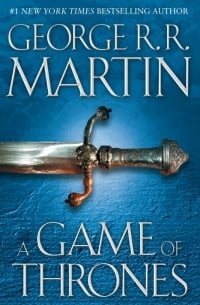 |
| Simon & Schuster |
Rick Yancey
2013
The Summary
"Will Henry and Dr. Warthrop have encountered many horrors together - but can Will endure a monstrumological terror without his mentor?
"Will Henry has been through more than seems possible for a boy of fourteen. He's been on the brink of death on more than one occasion, he has gazed into hell - and hell has stared back at him, and known his face. But through it all, Dr. Warthrop has been at his side.
"When Dr. Warthop fears that Will's loyalties may be shifting, he turns on Will with a fury, determined to reclaim his young apprentice's devotion. And so Will must face one of the most horrific creatures of his monstrumology career - and he must face it alone.
"Over the course of one day, Will's life - and Pellinor Warthrop's destiny - will lie in the balance. In the terrifying depths of the Monstrumarium, they will face a monster more terrible than they could have imagined - and their fates will be decided."
The Good
Finally, the series is finished. I read The Monstrumologist a few years ago (you can check out my previous review of The Monstrumologist here), and I was enchanted. Frightened, but utterly enthralled by the monsters that Rick Yancey created and/or revived from the brink of extinction.
And Will Henry - poor, young Will Henry who had the grievous misfortune to be placed into Pellinore Walthrop's care - is one of the most endearing characters I've had the pleasure to meet. He's articulate and intelligent, even as a young child; he's stalwart and dependable; he's a good, solid character who's tangled up in a web of intrigue and mystery and danger, and I loved reading his journals.
You have the opportunity to see how he grows, in which ways he (sometimes suddenly) matures. And in Final Descent, you have the opportunity to see him as an adult - to see how his tutelage under Walthrop his changed (or, rather, deformed) him. It's interesting and simultaneously terrifying to Will Henry all grown up, because we know that Will is no longer the same person we knew.
It's heartbreaking, and it rings with a note of grave finality. But it really couldn't have ended any other way, because, once Pellinore Walthrop made his ground-breaking discovery, his fate - and Will Henry's - was sealed. Final Descent is a heart-rending conclusion to a terrifying series that won me over.
And I'm glad to finally find closure.
The Bad
Will Henry is all grown up and, more or less, he's lost his mind.
No, I shouldn't say that. I don't think he's lost his mind; I think he's scarred, possibly changed - damaged - beyond any real redemption. And his journals reflect that.
Sometimes, his story becomes disjointed and wild, reflecting his state of mind. It's difficult to read when he's like that, because what he says and what he means don't always coincide. He's sometimes difficult to understand, and I'm often under the wrong impression about what's happening and what's going on - and it doesn't help that Will Henry bounces his narrative between different points in the past.
It's frustrating and, admittedly, a little terrifying.
The Ugly
I though the other books in the Monstrumologist series were scary - the anthropophagi and the wendigo were terrifying creatures, and Socotra is a horrible, horrible place I would never imagine visiting - but The Final Descent is worse.
Much, much worse.
I don't think I'll ever look at Will Henry the same way again.










